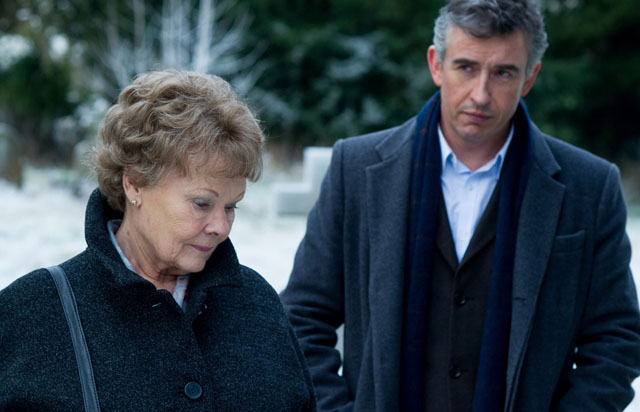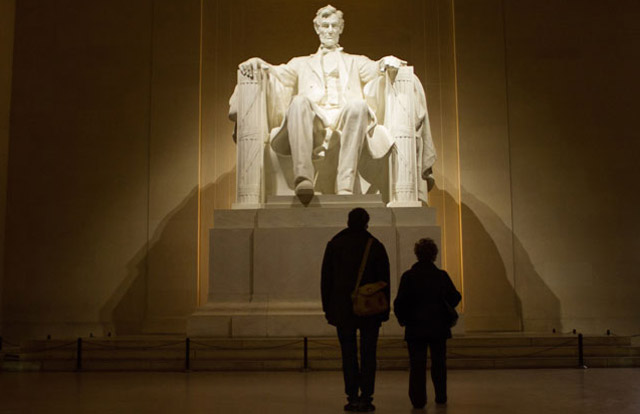CHICAGO – In anticipation of the scariest week of the year, HollywoodChicago.com launches its 2024 Movie Gifts series, which will suggest DVDs and collections for holiday giving.
Interview: Steve Coogan on the Art of Faith in ‘Philomena’
CHICAGO – “Philomena” is not a state of being or location. It is the name of a woman whose child was taken away, through Catholic adoption services in Ireland during the mid 20th Century. Judi Dench portrays that woman in a modern context, and her costar is notable British comedian – and co-screenwriter of the story – Steve Coogan.
Steve Coogan was born to a working class family in Middleton, Greater Manchester, and his early studies in performance was at the Manchester Metropolitan School of Theater. He began his career as a comic and impressionist, and broke through on the popular 1990s British TV series, “Spitting Image.” Later that decade, he developed his most famous persona, that of politically incorrect talk show host Alan Partridge (a feature length film of the character – “Alan Partridge, Alpha Papa” – was released in Britain this year). While doing several successful TV stints as Partridge, he also moved into films and continued to tour as a comedian. He had a more serious character role in the film “What Maisie Knew” (2013), and continued that trend with “Philomena.”
 Photo credit: The Weinstein Company |
HollywoodChicago.com attended a roundtable conversation with Steve Coogan about his role in “Philomena,” and the often acerbic comic personality he is known for became a surprising intellectual reflection of faith and purpose, regarding a film that is obviously very close to his heart.
HollywoodChicago.com: In screenings, it seems that all age groups have connected to ‘Philomena.’ What is your reaction to that?
Steve Coogan: What’s intriguing is that during test screenings in the State of Kansas, it scored as high as in screenings in New York or Los Angeles. That heartened me, because I didn’t specifically write it with middle America in mind. I’m pleased that it speaks to older people, because not many films are made for them these days, but I didn’t want it to be perceived as an ‘old ladies film.’ I wanted it to be universal, and younger people have told me it reminds them of their mother or grandmother. They get it from that angle.
HollywoodChicago.com: The character of Philomena is written so brightly, with not a stereotype of older people in evidence. How did you want to steer such a character when assembling the screenplay?
Coogan: When I read the story in the newspaper, I wanted to capture in the film what I first felt – it made me cry, made me angry, all that stuff. But the photo accompanying the story showed Martin [Coogan’s character] and Philomena laughing. I wanted to get that laughter in there as well. In looking at the photo, I thought they’d probably had a laugh. How could I capture that, and lift it?
Since I am half Irish, and was raised Catholic, I connected to that. I thought I knew enough about the material to not fall into the trap of just railing against religion, and neither did I want to be too liberal intellectual, or too afraid to have a laugh with an old Irish lady. Because we do laugh at her a bit, but we also dignify her. As long as you recognize that dignity, you’re on solid ground.
HollywoodChicago.com: What did you want to know about Judi Dench before you took on such a personal one-to-one acting role with her? What both excited you and intimidated you about the pairing?
Coogan: When we were talking about who would be the best choice to play Philomena, my co-producer Gabby Tena said ‘Judi Dench.’ I thought, woah, that’s pretty ambitious. When I went back to the Jeff Pope, the other screenwriter, he just said,‘really?!?’ [laughs]
I had never met her before, but got in touch with her agent through the BBC. The pairing is counterintuitive, as in ‘what about Steve Coogan and Judi Dench in a movie?’ The comic actor and the Grand Dame of the British Theater, it made it interesting, rather than one classy actor and another classy actor.
HollywoodChicago.com: Was the studio behind you?
Coogan: Yes, Pathé also thought it was interesting. So I went to her house, and told her the story. When the studio asked if she would do it, I did tell them there wasn’t loads and loads of great parts for older actresses. It was a part she could get her teeth into. She a great actor, and great actors want to stretch themselves a bit. They don’t want to do the same goddamn thing everytime. In the end, it appealed to her.
HollywoodChicago.com: This story is redemptive, but it’s not the usual redemption. How does that inform the atmosphere of your script?
Coogan: I didn’t want any neat resolution, because life is not like that. It’s about Martin accepting Philomena, and Philomena accepting Martin. It’s based on a true story, but the arc of the story is a dramatic creation. But it comes from a real place, more based on interviews I did with Philomena and Martin than Martin’s book – about what they thought about the events, rather than the events itself.
 Photo credit: The Weinstein Company |
HollywoodChicago.com: There is a heavy exploration of religion and religious forgiveness regarding the Catholic Church. How, as an ex-Catholic yourself, did you want to approach the sins of the church in the context of this story?
Coogan: There are people in my life who are still Catholic, who I respect and love, so if I point the finger at the church in the film – which I guess it does – I want to make sure that the ordinary people portrayed fairly, because Philomena represents people who live those quiet lives of faith. They’re not sexy, they are obedient, and they are the indirect victims of the scandals that engulf the church. My parents are like that, and I don’t want to piss on those type of people.
In preparing the script, I had a conversation with myself. We talk about ‘not believing,’ but there are plenty of things I do believe in – art, love, Shakespeare – that enrich lives. How would I feel if my parents turned around one day and said, ‘You’re right, Steve, you’ve won the argument. There is no God. It’s all a load of bull.’ How would I feel about that? I’d be devastated. It’s not for me, but I want to respect them. We don’t need to win the argument. It’s okay for us to have different views, as long as neither of us are hurting any one.
HollywoodChicago.com: That had to be significant to you, not only as an actor but as a person.
Coogan: I learned something when i wrote this – I learned that no one has a monopoly on wisdom. The only thing I’m certain of, is that no one should have moral certainty. Anybody who does say that, its fundamentalism. Where we all come together is in ‘we don’t have all the answers.’
HollywoodChicago.com: Aren’t you basically just saying that belief and faith is a personal thing?
Coogan: When Ireland had its recent economic boom, the heavy influence of religion diminished, which was better overall, because the Catholic Church had such a stranglehold there. But what happened to some extent is that the baby was thrown out with the bathwater. The people who value things beyond the material world – which is the comfort that religion provides – it’s the notion that we’re trying to do something else in this world, which has been lost along the way. This needs to be a conversation, not something that they or I win.
HollywoodChicago.com: I’m curious, what was the reaction in Ireland?
In Ireland, when the film came out, there were a lot of debates about it, mostly in our favor. Catholics understand the film, because they understand forgiveness. The ordinary people are dignified by it. Yet there is a line in the film in which I want the nun [who coordinated the adoption service] to say, ‘I’m sorry.’
 Steve Coogan in Chicago, November 18, 2013 Photo credit: Patrick McDonald for HollywoodChicago.com |
I retraced Martin’s steps in the film, and the Abbey did let the graves of the babies and mothers become overgrown, under four feet of weeds. And I thought, if you could look after the graves of the nuns, why couldn’t they tend the graves that actually expose their sins? That to me was the most eloquent symbol of how the church deals with these sins – ‘let’s hope it all goes away.’
HollywoodChicago.com: A few career questions. I thought your performance in the little-seen ‘What Maisie Knew’ this year was terrific. What did you understand about your character in that film, especially since you are a parent and have gone through some relationship issues?
Coogan: I have a daughter and a stepson, and I am attracted to imperfect characters. I think I behave better than that character in the movie in my own life, but I’ve had failings, and I channel them into those performances. I always want to find the humanity in people who behave badly. That does seem like a Catholic thing, because when I was raised Catholic – and there were things I liked and didn’t like. But you know when someone does a bad thing, and everybody wants his blood? I still think we shouldn’t judge that person, in the same way Jesus hung out with the prostitutes and sinners. That’s the good stuff.
HollywoodChicago.com: When I walked in here, I overheard you say you have a connection to Chicago. What is it?
Coogan: I’m half Irish, and I had relatives on that side came to Chicago. Those ancestors moved here in the 1930s, and they came to visit us in the 1970s. It was my great aunt who moved here, from the west of Ireland to Chicago, and even though she moved in the 1930s, all through the years people would remind me, ‘oh, you have an aunt in Chicago.’ She moved there nearly 80 years ago, and I still am reminded of Aunt Kathleen in Chicago. [laughs]
In those days, through letters that I found from my Irish great-grandfather, he thought they would never see her again when she moved to America. There was no jumping on a plane back then, once a person left that often ended up being the last time you saw them.
HollywoodChicago.com: Since this role, and the role from ‘What Maisie Knew’ were such departures for you, do you categorize yourself as a comic actor, or just an actor who happens to do comedy?
Coogan: I love comedy, but I got into it by default. My background is as an actor, and even though I’m known for comedy, as the years go by I want to use my acting background for something else. I wanted more meaning, and craved more substance. I was looking around, and found ‘Maisie,’ it was at a time when I was pissed that I wasn’t being able to get the gigs I wanted.
I’d rather use comedy to talk about important things. I like that ‘Philomena’ is about important things, but it’s not a tough film to watch. I don’t want to make films that when a person sees it on a menu, they think, ‘well, maybe I’ll watch it later.’ And, just as important, I don’t want to slash my wrists when I watch it again. [laughs]
 | By PATRICK McDONALD |


